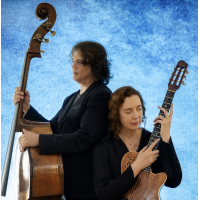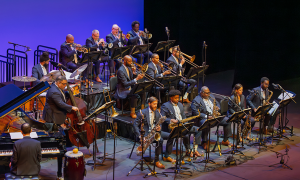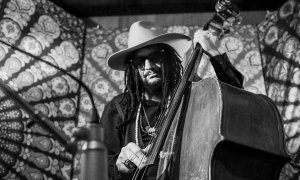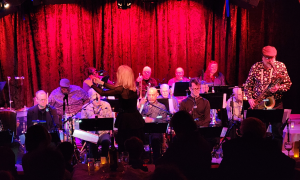Home » Jazz Articles » Live Review » Belgrade Jazz Festival 2021
Belgrade Jazz Festival 2021
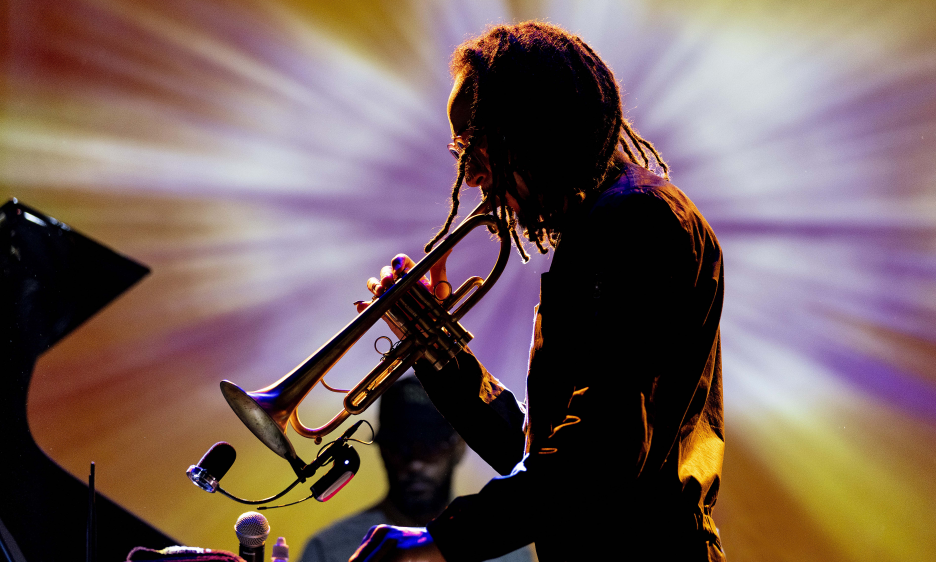
Courtesy Tim Dickeson
Dom Omladine/Kombank Dvorana
Belgrade, Serbia
October 26-November 1, 2021
The 37th Belgrade Jazz Festival made a full return to its accustomed international nature, following the late 2020 mostly-Serbian edition. Artists successfully managed to arrive from the USA and various parts of Europe, with no cancellations in the programme. This was also the 50th anniversary of the BJF, taking into account the 'missing' war-years in the divided post-Yugoslavian landscape. As ever, each evening began with a larger double bill concert in the downstairs theatre at 7pm, followed by a shift upstairs to the smaller Amerikana suite, for a 10.30pm double bill, or with the second night's Serbian Showcase, three acts.
It's been a few years since your scribe caught the Florida-born trumpeter Theo Croker as part of Dee Dee Bridgewater's band. Now he's recording and touring with his own outfit, darting around in a cocktail coloured by the juices of soul, funk and hip hop. Now he has greater space for soloing, and he's even singing on some numbers. Michael King swivelled around his spread of piano, Hammond organ, Moog and Fender Rhodes, and the combo also included a 'bonus' laptop artist. A lot of live sampling ensued, swirling around in the funk plasma, swilled around in the mouth of the mind. Michael Ode provided rolling thunder drums under the poignant piano voicings, as Croker floated high overhead. There were Arabic-sounding piano insertions, and Croker polished off with a climax over drum figures that were descended from the work of Denardo Coleman. During one song, Croker managed to head from slinky rap delivery towards a more traditional jazz scat swing-out.
Markus Stockhausen's set was slightly disappointing, given that previous experiences of his playing have usually been prickly, emitting a smoulder of excitement, whether playing jazz or moderne music, or some other hybrid form. The Cologne-born trumpeter's Group also included keyboards, bass and drums, opening up their set with "Sunday Morning" and "A Smile." On flugelhorn, Stockhausen took a gentle country stroll, becoming more abstract for his third piece, which marked a preferable direction, probing space, with bowed bass and metal stroking from Sebastian Gramss and Christian Thomé. Quite far in, Stockhausen eventually picked up his trumpet, feeding it through his laptop, controls set for a cosmic place. The band roused themselves for the final piece, which possessed a driven momentum, bass and drums meshing, flugel darting over echo-streams. Beanpod shakers and skating bowed bass helped escalate towards abandonment, while Stockhausen crouched in waiting, ready to pounce.
The Swedish/Norwegian trio of Rymden are now resuming their prolific touring activities, rapidly refining their recent compositions. Their styles are many, incorporating pure acoustic and mangled electronic frameworks, jacking from funk to symphonic, big beat to fragmentation, anthemic to abstract. Bugge Wesseltoft is the master of the weebly strut, underpinned by the deep agility of Dan Berglund's basslines and the hyperactive drums and percussion of Magnus Ostrom. A Rhodes horror-flick sound made the transition to a Moog space aura, as Wesseltoft had one hand on each keyboard, alternating parts. Öström used light reed-sticks for a heavy beat, making a sudden slow-down, and softening to a halt. There were strategic details, such as when Öström struck a single isolated bell-hit, or Berglund made a lightly-fingered bass figure into a sudden dubscape, his strings groaning like massed whalesongs. The Rymden rapport now appears even more ingrained, their funk gripping hard, as Wesseltoft has no inhibitions about using his entire spread like it's a single instrument, with no divisions.
The Serbian Showcase opened with Jasna Jovicevic (saxophones/bass clarinet), playing with fellows from Poland and Hungary, Ksawery Wojcinski (bass) and Sylvester Miklós (drums). Despite your scribe's regular attendance at the BJF in recent times, he hadn't witnessed her playing, even though she's been active on the scene for almost two decades. Straight off, this trio was the most impressive of the night's Serbian acts. Wójciński sounded more like a cellist, with his graceful sonics, heavily ornamented, as Jovićević opened on bass clarinet, slurring with organic warmth. The improvisation was restrained and thoughtful at first, and a more traditional groove developed when she switched to alto, Miklós taking a solo that stemmed from the Paul Lovens zone. Halting stops were made, leading up to a gong-quake, with slipped metal contact, bent tonalities, and a Korean-style shimmer. Already, Jovićević now held her soprano, shooting fast, on the run, as Miklós clambered up an incline, with broken nails, sending granite showers down the mountainside.
The following pair of outfits were all-Serbian, in their ranks. Drama Quartet featured a line-up of alto saxophone, guitar, bass and drums, operating in the funk-jazz department. Their dense activity sometimes took on an advanced twitching sound, adopting a recent style-pattern, although guitarist Andreja Stanković projected a retro 1980s sound. The foursome's aim seemed to be an updating of jazz funk into a modernised incarnation.
Drumbooty presented a mainstream, though energetic, fusion form,with their twinned keyboards joined by alto saxophone, guitar, bass and drums. This was the acceptable face of fusion, for those who might be selective, although for their climax Drumbooty veered towards a freeform state, radiating great power, with a strong Balkan character emerging. The only snag was that, next, both keyboards and the alto began sounding like they were all electronic wind instruments.
Another evening brought another themed gathering, this time with Poland providing the focus, in the main hall. Reed star Joe Lovano brightened up the increasingly somnambulant Marcin Wasilewski Trio, reflecting the contents of their ECM collaboration Arctic Riff. An endlessly floating ballad sequence opened up their set, remaining terminally delicate for what seemed like a considerable spell. Soon, Lovano provided solos, like injections to revive, picking up a bebop pace by the third number of the set. This was when he started to bring in The Lovano Crouch, so the audience knew that he was beginning to get warmed up, prompting Wasilewski (or rather, forcing him) to play faster than we'd ever heard him play before. This was a tune by the influential Polish violinist Zbigniew Seifert, and probably "Turbulent Plover."
Into The Roots were next up, a trio led by the trumpeter Piotr Damasiewicz, featuring Zbigniew Kozera on the Moroccan sintir, and Pawel Szpura on drums. Damasiewicz also played harmonium, and spent much of his time singing, or exhorting the audience vocally. Conjuring images of Don Cherry was unavoidable, given this rootsy, folkloric expression of their improvisatory palette. Not so much via any similarity of horn style, but rather the general approach and ingredients. It became a kind of energised Polish mountain folk. Kozera picked up his upright bass, bowing beside Szpura's splash of cymbals. The Seifert tune for this set was "Pinnochio," beginning with heavy abstraction, but gradually coalescing.
The third Polish artist was violinist Mateusz Smoczyński, leading his trio, but this gig was running so much overtime that there had to be a direct choice between this set, and the preparing-to-begin Spinifex band, upstairs in Amerikana.
Spinifex are a ridiculously geographically mixed ensemble, with members drawn from Belgium, Portugal, Germany, the USA and the Netherlands. They are sharply arranged, open to a disciplined wildness when soloing, or simultaneously interacting, and pay equal attention to free jazz and spiked rock. Chief composer is saxophonist Tobias Klein, a German living in Amsterdam, which is also home to guitarist Jasper Stadhouders. Trumpeter Bart Maris hails from nearby Gent, and bassist Gonçalo Almeida resides in Lisbon. Saxophonist John Dikeman is American, but also dwells in Amsterdam. Drummer Philipp Moser is another German in the combo. Despite their high degree of control, the results frequently have an anarchic nature, with driving themes, off-kerb digressions, with caterwaul horn-parts: a siren empathy, with Arabic striations sometimes invading. Stadhouders stands in a howl-corridor, a terminal tunnel of guitar, constructed free, and prog-wild. Can we say how prepared in advance all this active freebase soloing could be? A glissando interlude helps prepare for a throttling Dikeman a capella section, as a tune seemingly titled "Sex And Pestilence" turns out to be an instant hit.
This was almost too much of a good time, as another of the festival's most exciting bands played right afterwards, another mixed-up crew in the form of Angles 8, with players combined from Sweden and Norway. Led by saxophonist Martin Kuchen, this time his seven cohorts played saxophones, trumpet, trombone, vibraphone, piano, bass and drums. This is another group where the line between composition and improvisation is finely engraved. Mattias Stålhl's vibes are prominent in the spread, as a leading instrument, but he still has the serrated horn pounce to combat for attention, with their stoking roller-accumulation, as pianist Alexander Zethson makes hard jabs. Angles 8 also clear a floor for luminescent thoughtfulness, beside all of the barnhouse roughage aspects, of eternity fingering against measured piano tolling-progressions. They often attain a majestic polyphony.
At the BJF's midway point, a Norwegian supergroup combining the generations. Veteran bassman Arild Andersen had the much younger saxophonist Marius Neset spearheading his group, joined by Helge Lien (piano) and Håkon Mjaset Johansen (drums). The presence of Neset pushed Andersen's music into a touger, faster area, not so much dwelling on the serene, contemplative aspects of his repertoire. Choosing soprano horn at first, he softly blew a swinging refrain, as Johansen used light rushes-sticks across his collection of tiny objects. Fluid dynamics were paramount, as Andersen soloed, his cohorts bending around him with suppleness, resting and rousing in turn. When Neset switched to his tenor horn, a blues-funk character took over, led by a woozy, slurred-phrase solo, entering straight after Andersen's midnight cellar bass solo.
Ghost Horse had the sound of a street band, its horns dominant, with tenor saxophone, trombone and tuba making the most of their lower tones. Baritone guitar, bass and drums completed the roster of this Italian band. There was a stirring communion between Glauco Benedetti (tuba) and Joe Rehmer (bass), underpinning the blasting and jostling horns. Dan Kinzelman swapped to bass clarinet, perhaps feeling that the terrain wasn't dipping quite as low in tone as desired. Benedetti also played his euphonium, as an alternative to tuba. There was 'bone burble and bowed guitar, slow drawling, grooving with heavy effects applied to the latter, heading into a murky psychedelic slow-drive, possessing a growing threat. Ghost Horse climaxed with a stalking minimalist number, the band members softly singing 'Belgrade,' surely their freshly favoured city.
The Itamar Borochov Quartet was yet another band with an international combination, its members hailing from Israel, Belgium, Italy and the USA. An immediate Middle Eastern flavour permeated, as the set opened as if it was already in progress on another plane. Alessandro Lanozi's Fender Rhodes introversion refracted, establishing a marked mood of meditation. Borochov's playing called to mind that of the modally varied Ibrahim Malouf, powdered throughout an extensive opening solo, gradually setting up a groove. He worked up to several ultra-ripping high-note peaks, as this romantic parade of melancholy mood continued, populated by repeated high-vaulting episodes. Lanozi had a faint gristle hung from the edges of his amplifier sound. The entire set was an inward meditation, masterful as Borochov's horn almost sounded like a duduk, when he chose its softer side. It was like a suite, topped with a final electro-tinged explosion.
Maria Schneider didn't travel with her own Stateside crew, but instead linked up with the Subway Jazz Orchestra from Cologne, naturally working with them to produce her signature landscape of sound. This gig happened in Kombank Hall, the main music theatre of Belgrade. Schneider's conducting style is very precise, though clearly springing from the heart, and open to spontaneous instinct. Her movements have clear meanings, but they also perform as a visual expression of her compositions, acting as a conduit for the audience to embrace her music. This was a set that flowed throughout Schneider's entire catalogue, whereas a show with her American orchestra will usually focus on more recent works. "Gumba Blue" is an earlier piece, from 1994, its pace quickly picking up into a chase scenario, with trombone and alto saxophone solos, before slowing to an easy swing. As ever, she gives solo room to the more unusual accordion, also inviting a bass trombone embellishment with the raising of a finger. One of her other signals is the bonding of her fists, another prompts differing responses from separate wings of the orchestra, or she will gently point, all moves designed to establish a composition's fabric, pulse and emphases, its circulatory expansion.
After a short break, the second set featured the more expected "Data Lords," Schneider's recent 'hit' tune, operating out of her darker side, as it questions and challenges the negative face of digital communication and dominance. 'Humans, die!,' as an artificial intelligence being might shout. Black clouds billowed, as spider fingers were also found in Schneider's armoury. Heidi Bayer took a blistering trumpet solo, then an alto saxophone solo capitalised on this energy-shot, courtesy of Johannes Ludwig.
Very soon, a short walk to the Amerikana suite found the mysterious TGB ready for action. They're a Portuguese trio with the slightly unusual line-up of Mário Delgado (guitar), Sérgio Carolino (tuba) and Alexandre Frazão (drums). Driving beats, heavily-effected tuba and twanging guitar united in the name of jazz, funk, rock, country, surf rock, rockabilly, but mostly grooverama. Their set melded numbers from their established songbook with tunes that were so fresh that they hadn't yet been titled. Although Portuguese, TGB have a heady aroma of NYC extremity and style-collision, particularly from the late-1970s no wave punk-funk era.
The Brad Mehldau Trio played the only set of the festival's final day, which was essentially an addition to the core programme. In recent years, such an extra evening extension has pretty much established what looks like being a new tradition. We could give Mehldau, bassist Larry Grenadier and drummer Jeff Ballard our complete attention of the day. It was wonderful to witness this trio again, as the last few recent occasions that your scribe has caught Mehldau he's been playing solo. When he pauses between runs of playing, Mehldau shadowboxes, feinting as he decides on the contents of his next outpouring, as Grenadier continues his spotlit segment.
Ballard took a solo, with a tonal ringing being either slight feedback, or natural theatre acoustics. Mehldau lightly played themes, then made a firmer pounce when embarking on the full improvisation of a solo journey. He played "Dark Turn Of Mind," a tune penned by Gillian Welch and David Rawlings, followed by the more familiar "Brownie Speaks" and "All The Things You Are," by Clifford Brown and Jerome Kern respectively. Then there was Nick Drake's "River Man" and Cole Porter's "In The Still Of The Night" for encores, the latter a straight-ahead rush aside from Ballard's immense, extended free-form solo, Mehldau jumping back in for a swingin' lounge deceleration, a bluesy tenderising.
The Belgrade Jazz Festival has managed to successfully navigate the lockdowns of 2020 and '21, partly by luck of timing, either by postponement or fortunate placement of month, and partly through sheer committed tenacity, working through the regulations to present what they were able, when they were able. They were one of the few festivals to leap into a fully international 2021 programme, taking chances on whether borders were open, or whether acts might have to be replaced at short notice. They succeeded in fine style!
Tags
Live Review
Martin Longley
Serbia
Belgrade
Theo Croker
Dee Dee Bridgewater
Michael King
Michael Ode
Denardo Coleman
Markus Stockhausen
Sebastian Gramss
Christian Thomé
Bugge Wesseltoft
Dan Berglund
magnus ostrom
Jasna Jovicevic
Ksawery Wójciński
Sylvester Miklós
Paul Lovens
joe lovano
Marcin Wasilewski
Zbigniew Seifert}, and probably "Turbulent Plover."
Into The Roots were next up, a trio led by the trumpeter {{Piotr Damasiewicz}, featuring {{Zbigniew Kozera Paweł Szpura Don Cherry Mateus Smoczyński Tobias Klein Jasper Stadhouders Bart Maris Gonçalo Almeida John Dikeman Philipp Moser Martin Kuchen Mattias Stålhl Alexander Zethson Arild Andersen marius neset Helge Lien Hakon Mjaset Johansen Itamar Borochov Ibrahim Malouf Maria Schneider Heidi Bayer Johannes Ludwig Alexandre Frazão brad mehldau Larry Grenadier Jeff Ballard Clifford Brown Jerome Kern Cole Porter
Into The Roots were next up, a trio led by the trumpeter {{Piotr Damasiewicz}, featuring {{Zbigniew Kozera Paweł Szpura Don Cherry Mateus Smoczyński Tobias Klein Jasper Stadhouders Bart Maris Gonçalo Almeida John Dikeman Philipp Moser Martin Kuchen Mattias Stålhl Alexander Zethson Arild Andersen marius neset Helge Lien Hakon Mjaset Johansen Itamar Borochov Ibrahim Malouf Maria Schneider Heidi Bayer Johannes Ludwig Alexandre Frazão brad mehldau Larry Grenadier Jeff Ballard Clifford Brown Jerome Kern Cole Porter
PREVIOUS / NEXT
Theo Croker Concerts
Support All About Jazz
 All About Jazz has been a pillar of jazz since 1995, championing it as an art form and, more importantly, supporting the musicians who make it. Our enduring commitment has made "AAJ" one of the most culturally important websites of its kind, read by hundreds of thousands of fans, musicians and industry figures every month.
All About Jazz has been a pillar of jazz since 1995, championing it as an art form and, more importantly, supporting the musicians who make it. Our enduring commitment has made "AAJ" one of the most culturally important websites of its kind, read by hundreds of thousands of fans, musicians and industry figures every month.







